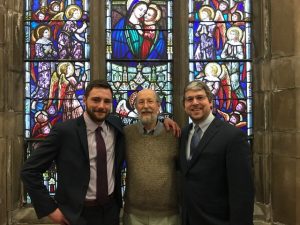The Challenges Facing Podcast Hosts Protecting Trademarks
 Among the many technological changes in the 2010s was the rise of podcasts as a form of entertainment. Average people were able to purchase microphones and record conversations with their friends, family, or experts in a field, and then upload for people across the world to listen to.
Among the many technological changes in the 2010s was the rise of podcasts as a form of entertainment. Average people were able to purchase microphones and record conversations with their friends, family, or experts in a field, and then upload for people across the world to listen to.
Three brothers, Justin, Travis, and Griffin McElroy started recording the comedy-advice podcast “My Brother, My Brother, and Me” in 2010. After that podcast’s success, they went on to record several other podcasts, including “The Adventure Zone,” in which they play tabletop role-playing games with their father, Clint. This podcast has been done in three main storylines: “Balance,” “Amnesty,” and “Graduation.”
“The Adventure Zone” appears to be the most popular podcast released by the McElroys. Thousands of fans follow subreddits and Facebook pages and groups. “The Adventure Zone” has been adapted into a best-selling graphic novel, licensed for a tabletop role-playing game, and is currently being adapted for a possible animated show for the streaming platform Peacock.
With this fame has come devoted fans, some of whom make fan art and then sell it. This practice is largely disapproved by the McElroys, although they have not taken any legal action against creators of unauthorized merchandise. Justin McElroy has implied on Twitter that he is okay with people commissioning artists to draw characters from “The Adventure Zone.” This detail is lost by the fans, who treat all fan-creations for sale as bad. While the McElroys have created a podcast, which they appear to make money from, and they have a right to protect their creation from people seek to unscrupulously profit from it, there are challenges facing them, as well as other podcast hosts.
This is the focus of my paper You Must Roll 18 or Higher in Order for Your Claims to Succeed: Common Law Trademarks, Unauthorized Merchandise, and the Podcast “The Adventure Zone,” about which I was interviewed on the podcast “Ipse Dixit” by Prof. Brian L. Frye of University of Kentucky College of Law.

 Former student guest blogger and current 2L Monica Reida recently appeared on Ipse Dixit, a podcast on legal scholarship that has a wide audience among law professors, to discuss their fascinating new paper,
Former student guest blogger and current 2L Monica Reida recently appeared on Ipse Dixit, a podcast on legal scholarship that has a wide audience among law professors, to discuss their fascinating new paper, 